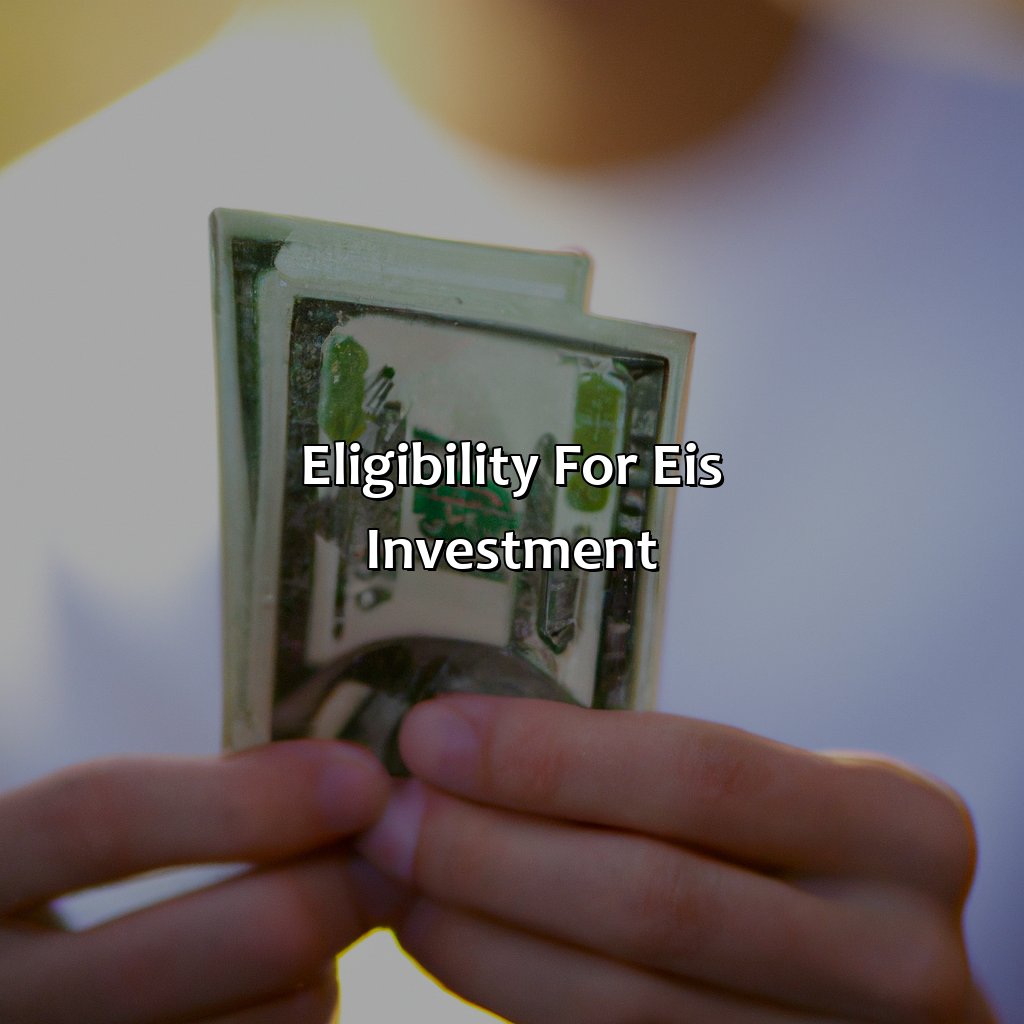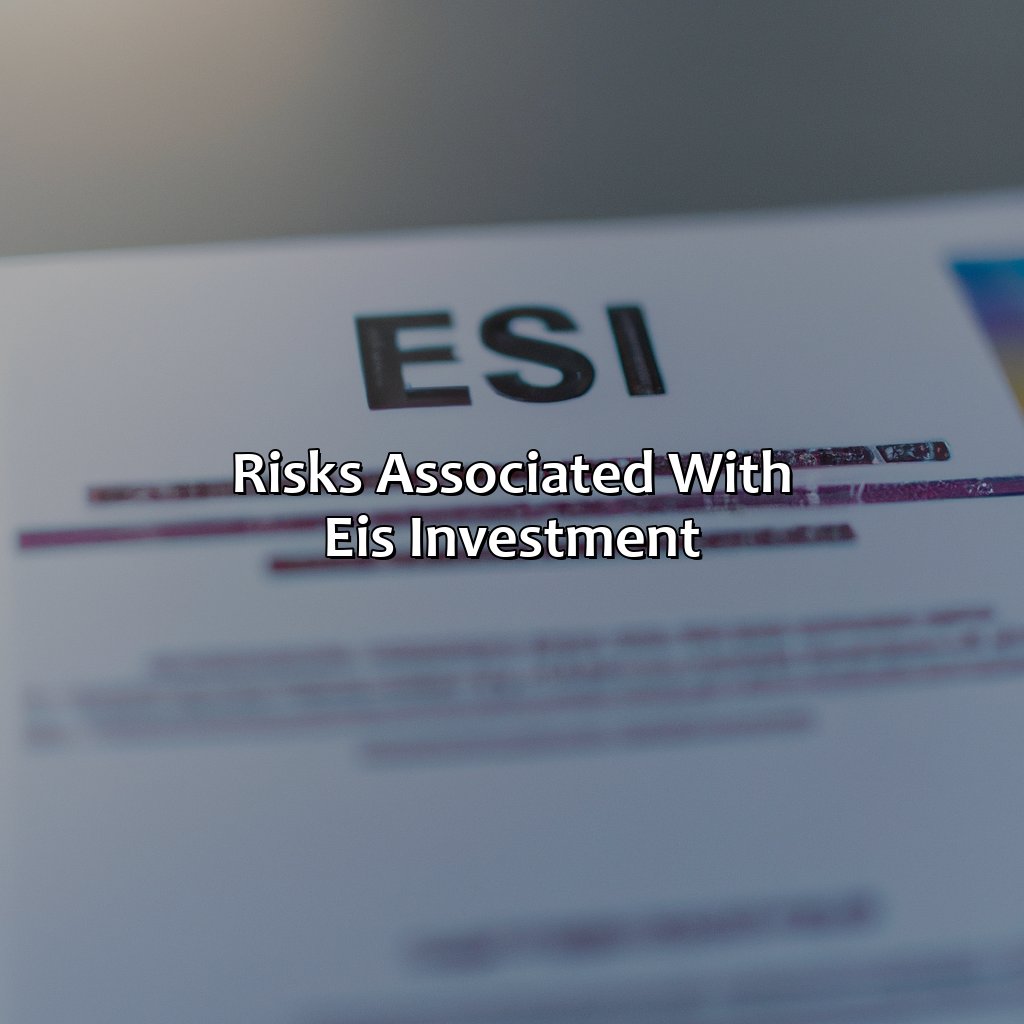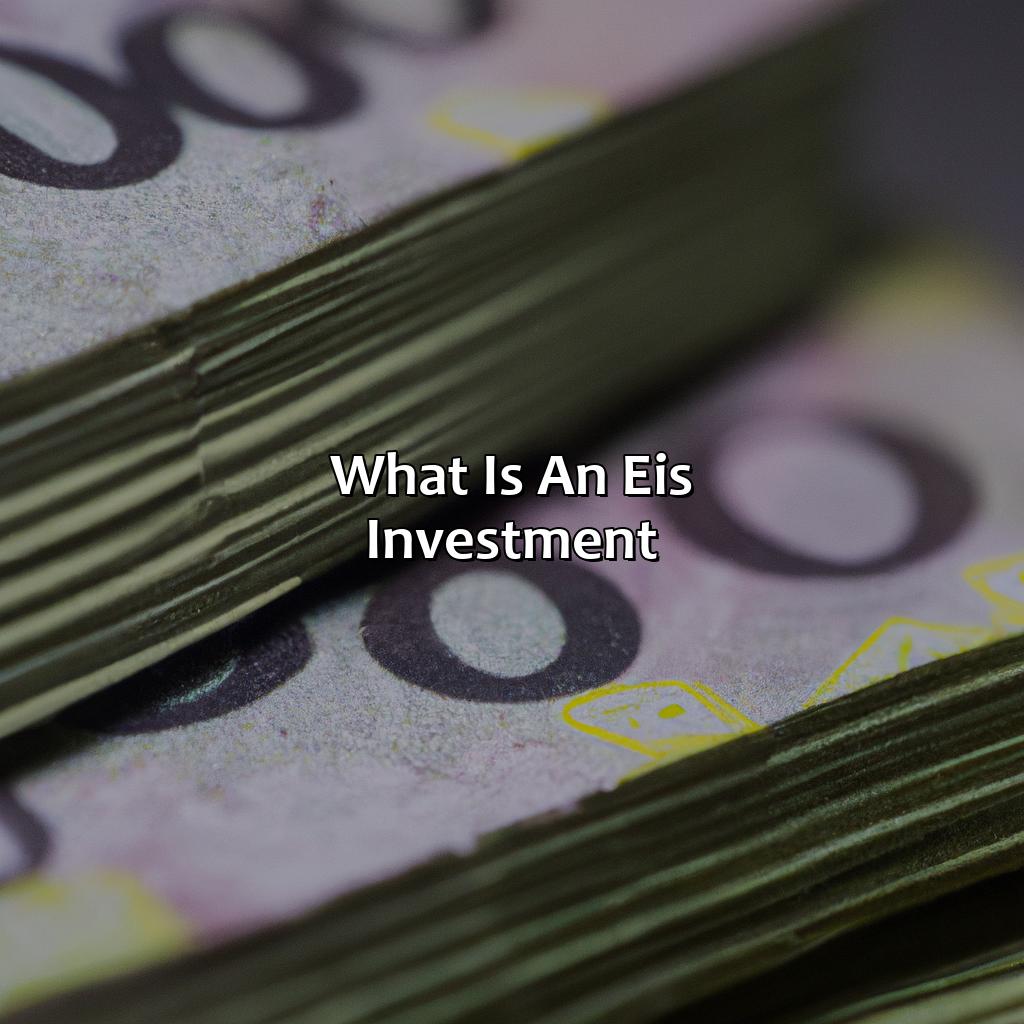What Is An Eis Investment?
Key Takeaway:
- An EIS investment, or Enterprise Investment Scheme investment, is a UK government tax incentive designed to encourage investment in small and growing businesses.
- EIS investments offer generous tax benefits, including income tax relief, capital gains tax relief, and inheritance tax relief, which can make them an appealing investment option for high net worth individuals.
- While EIS investments offer significant tax benefits, they also come with risk, including the risk of losing your investment. It’s important to carefully evaluate the investment opportunity and consider ways to mitigate risk, such as investing in a diversified portfolio of EIS-qualifying companies.
Are you considering an EIS investment, but not sure what it means? Investing in EIS can provide big rewards, but it’s important to understand the risks before you take the plunge. In this article, we’ll explore what EIS investments are and how to access them.
What is an EIS Investment?
Gain clarity on EIS investment; explore the definition and tax advantages. See what it is and how it can be beneficial.
Definition: EIS investment explained.
Tax benefits: discover the tax break it offers.

Image credits: retiregenz.com by Joel Jones
Definition of EIS Investment
An EIS investment is a tax-efficient way of investing in small, private companies. This scheme was introduced by the UK government to encourage investment in start-ups and early-stage businesses. Investors can claim up to 30% income tax relief on investments of up to £1 million per tax year, and they can also benefit from capital gains tax deferral and exemption.
Investing in an EIS scheme comes with certain risks as the companies involved are often at an early stage of development. This means that there is a higher risk of failure compared to investing in more established firms. However, investors can choose from a range of sectors and invest in businesses that align with their personal beliefs or interests.
It’s important to note that EIS investments require careful consideration and due diligence before committing funds. Some tips for successful investment include: researching the management team, assessing the market opportunity and understanding the potential risks involved.
Investing in EIS is like having a rich uncle who also happens to be a tax expert.
Tax Benefits of EIS Investment
Investing in EIS offers unique opportunities for getting tax benefits alongside funding start-ups and small businesses. Here, we will explore the tax advantages of investing in EIS.
- EIS investors receive 30% income tax relief on their investment.
- Any capital gains made through investment are free from tax.
- If the investment suffers a loss, such losses can be offset against one’s income or capital gains within the same year or carried forward indefinitely.
- Investors can defer CGT on any gains they make from selling other assets by investing an equivalent amount into EIS-qualifying companies.
- One can also extract profits after just three years without affecting eligibility for EIS income tax relief, provided those funds are reinvested within a year.
It is noteworthy that not all businesses qualify for EIS investments as they must meet specific criteria set out by HMRC. Look for startups that provide good credentials to increase your chances of maximum returns.
Pro Tip: Consult a financial expert before making any decisions related to investments because it is crucial to avoid any mistakes that might be costly in the long run.
Ready to invest in EIS? Just remember, not everyone is eligible – it’s like trying to get into a club with a strict dress code, except instead of fancy shoes, you need serious cash.
Eligibility for EIS Investment
Are you eligible for EIS investment? To find out, check the criteria. Investing in EIS-certified companies has many benefits. Know what to look for. Here are the key points:
- Qualifying companies for EIS investment
- Eligibility criteria for EIS investors.

Image credits: retiregenz.com by Adam Woodhock
Qualifying Companies for EIS Investment
Investments made under the EIS scheme are intended to support small and medium-sized enterprises (SMEs) by providing them with access to much-needed funding. EIS eligible companies must meet several criteria; they should be unquoted, have less than £15 million in assets and fewer than 250 employees, among others.
These qualifying companies must also operate in specific sectors such as manufacturing, agriculture, film production or technology. Additionally, the funding raised from EIS investment should be used for growth activities rather than day-to-day operations.
It is important to note that some businesses are specifically barred from EIS investment. These include businesses focused on property development or management, energy generation or storage projects which involve significant risk.
EIS investors can receive a range of tax reliefs including income tax relief of up to 30% on investments up to £1 million per year. Capital gains realized on disposal of shares held for more than three years will not attract capital gains tax. The risks associated with investing in EIS eligible companies is high but so are the potential benefits like good returns and supporting entrepreneurship and innovation.
In one instance, a startup operating within the technology space received funding through an EIS investment. This enabled them to scale their product offering quickly by hiring more staff and expanding marketing efforts whilst simultaneously developing new features requested by existing clients leading them towards greater profitability.
Get ready to prove your investing eligibility, because wanting to invest in EIS just won’t cut it.
Eligibility Criteria for EIS Investors
EIS investment is a popular option for people looking to invest in early-stage companies. To be eligible for EIS investment, investors must meet certain criteria related to their income, residency status, and level of involvement with the company. These criteria are designed to ensure that the investor is well-informed and able to handle the risk associated with investing in a startup.
Investors must have a minimum income threshold of £100k per year or possess £250k worth of assets (excluding their primary residence). They must also be UK taxpayers and purchase new shares directly from the issuing company. Furthermore, investors cannot own more than 30% of the company’s shares or be connected individuals such as family members, business partners, or employees.
Other essential criteria include the investor being at arm’s length from the company they are investing in. Moreover, there should not be any prearranged exits between the investor and entrepreneurs before three years following investment initiation. Finally, investors must hold shares for no less than three years to qualify for EIS tax relief.
Before investing in EIS, remember: the bigger the potential reward, the bigger the potential for a regrettable loss – but hey, risk is just another word for adventure, right?
Risks Associated with EIS Investment
Be aware of the potential risks of EIS investment! Understand the risks associated. We’ll discuss the drawbacks and provide solutions for reducing them. Mitigate the risks for EIS investors! Get informed on how to do this.

Image credits: retiregenz.com by James Arnold
Potential Risks for EIS Investors
Enterprise Investment Scheme (EIS) is a tax-efficient investment scheme for individuals seeking to invest in small and high-risk businesses. There are inherent risks involved in EIS investments, including the risk of financial loss due to business failure. Additionally, there may be liquidity issues that could result in difficulty in selling shares when required.
Investors should also be aware of the possibility of fraud or mismanagement by the companies in which they invest. Some companies may overstate their potential returns or provide inaccurate financial statements, leading to losses for investors. Furthermore, legislative changes such as modifications to EIS tax reliefs can impact returns on investments.
Investors should conduct due diligence before investing in any company under EIS schemes and obtain professional advice. They should also note that the minimum holding period for EIS shares is three years, which limits liquidity.
According to Forbes, approximately 65% of all early-stage technology startup investments through venture capital funds fail to deliver projected returns.
Mitigating EIS investment risks is like wearing a life jacket in a shark tank – necessary for survival.
Ways to Mitigate Risks in EIS Investment
There are a number of methods to reduce the risks associated with investing in EIS. Here are five ways to mitigate risks:
- Opt for a diversified portfolio: Investing in multiple ventures across various sectors can help spread out the risk and offer exposure to a range of opportunities.
- Look for high-quality sponsors: Do research on the management team, their track record, and past investments to assess if they have the ability to execute their business proposition effectively.
- Understand tax implications: EIS investments offer tax relief benefits, but understanding how these work is key in identifying if it’s suitable for you as an investor.
- Assess Exit Strategies: Explore options available before making an investment decision as this will assist in knowing how to get returns from your investment.
- Risk vs. Reward Profile: Consider the potential risk-reward profiles of different deals and assess if the venture aligns with your own goals.
Additionally, it is important to ensure that when deciding whether or not to invest, you consider all pertinent information related to talent pool quality as well as economic fundamentals on both local and global scales.
It’s suggested that investing in early-stage ventures requires patience; however, savvy investors may capitalize on profitability by being meticulous about mitigating risks during their due diligence process. By taking the time, effort, money and focusing on finding high-quality sponsors, doing good research on exits strategies and diversification can benefit investors through providing worthy returns on investments.
Five Facts About What Is An EIS Investment:
EIS stands for Enterprise Investment Scheme, which is a government-backed scheme to encourage investment in small and growing businesses in the UK. (Source: Seedrs)
EIS investments offer tax relief benefits to investors, including income tax relief, capital gains tax exemption, and inheritance tax relief. (Source: Gov.uk)
EIS investments have eligibility criteria for both the investor and the company receiving investment, such as limitations on company size and age, and investor income and shareholdings. (Source: Wealth Club)
EIS investments come with a certain level of risk involved, as they are typically made in early-stage businesses that are not yet profitable. (Source: Investopedia)
EIS investments have seen increasing popularity in recent years due to their tax relief benefits and potential for high returns. (Source: Financial Times)
FAQs about What Is An Eis Investment?
What is an EIS investment?
An EIS (Enterprise Investment Scheme) investment is a type of investment scheme offered by the UK government to encourage investment in small and growing companies. It provides investors with generous tax relief and other benefits in return for investing in these companies.
What are the benefits of an EIS investment?
The main benefits of an EIS investment are the generous tax reliefs that are available to investors. These include income tax relief of up to 30%, capital gains tax exemption, and inheritance tax relief. In addition, EIS investments also offer the opportunity to invest in companies with high growth potential and potentially earn significant returns.
Who can invest in an EIS investment?
Anyone who is a UK taxpayer can invest in an EIS investment. However, there are restrictions on the amount you can invest and the companies you can invest in.
What types of companies can you invest in through an EIS investment?
To qualify for EIS investment, companies must be based in the UK and have fewer than 250 employees and assets of no more than £15 million. In addition, they must be engaged in an eligible trade, which excludes certain industries such as property development, financial services, and legal and accounting services.
What are the risks associated with EIS investments?
As with any investment, there are risks associated with EIS investments. These include the risk that the company you invest in may not perform as expected, as well as the risk of loss of capital. In addition, EIS investments are illiquid and typically require a long-term investment horizon.
How do I find out more about EIS investments?
If you are interested in investing in an EIS scheme, you should speak to a financial advisor who can help you understand the risks and benefits of this type of investment. You can also find more information online through government websites and EIS investment providers.
 Checkout this IRS Loophole
Checkout this IRS Loophole 
